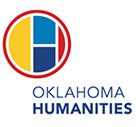
Virtual Programs
Notice for Young or Sensitive Viewers
Presentations include historical accounts, quotes, and excerpts, which may include offensive language, negative stereotypes, and descriptions of traumatic events. Materials are presented uncensored and unaltered to reflect the historical record, and some content may be disturbing to viewers. These do not necessarily represent the viewpoints of the Oklahoma Historical Society.
“Perspectives in History,” the 2021 Oklahoma History Conference
Recordings of Live Sessions with Q&A Now Online!
Recordings of the live presentations and Q&A session (with the exception of the keynote) are now available.
“A Conversation with Hannibal B. Johnson: The Tulsa Race Massacre and Greenwood Rising”
Hannibal B. Johnson, esquire, chair of the Education Committee for the 1921 Tulsa Race Massacre Centennial Commission and local curator of Greenwood Rising; Larry O’Dell is the director of development and special projects, OHS
“Developing a Strategic Plan for Your Historical Organization”
Kathy Dickson, director of Museums and Historic Sites Division, OHS
“Endurance Strategies: Indigenous People in Central Oklahoma During the ‘Orgy of Exploitation’”
John Truden, history doctoral graduate student, University of Oklahoma
“The Ghosts of Creek County: Revisiting Oil and Indigenous Sovereignty”
Russell Cobb, author and associate professor, University of Alberta
“Good, Better, and Best Practices for Collections Care”
OHS staff Jeff Briley, deputy director of the Oklahoma History Center; Mallory Covington, CA, archival collections manager; Jennifer Holt, curator at the Will Rogers Memorial Museum; and Karen Whitecotton, director of collections for OKPOP.
Download slides (PDF)
Download accession checklist (Excel)
“Historical Considerations in the Creek Nation Reservation Cases”
Susan Work, attorney and author
View source list (PDF)
“The Misremembered ‘Uncle’ Wallace and ‘Aunt’ Minerva: Establishing Father-Daughter Kinship”
Shelby Ward, attorney and genealogist
“Project VOICE: Visions of Inclusion, Culture, and Empathy”
Savanna Payne and Jamie Hinds Blank, English language learner instructional facilitators, Oklahoma City Public Schools
“The Tulsa Council of Defense v. Andrew J. Smitherman”
Randy Hopkins, attorney (retired)
Special Programs
Oklahoma Historians Hall of Fame Induction and Awards Ceremony
Red Dirt Rangers Musical Tribute to Steve Ripley
On-Demand Sessions
“Acquisitions as Activism: Preserving and Celebrating Creative and Cultural Legacies Through Collection Development”
Todd Fuller, curator, Western History Collections, University of Oklahoma
“A Disgraceful Blot: Oklahoma Territory and the Victorian Divorce Crisis”
Jennifer Lynch, instructor, University of Central Oklahoma
“Finding Isaac Rogers”
Nicka Sewell-Smith, genealogist
“Fluid Resistance: A Queer Analysis of Art and Politics in Oklahoma”
B Hinesley and Arlowe Clementine, public history graduate students; Macy Jennings and Jacie Earwood, art history graduate students; and moderator Dr. Laura Arata, assistant professor, history department; all of Oklahoma State University
“The Legend of Cora Youngblood: Oklahoma’s Forgotten Prodigy”
James P. Gregory Jr., doctoral graduate student, University of Oklahoma
“A Mexican Oklahoman History”
Jorge Luis Chavez, public history graduate student, Oklahoma State University, and assistant curator of education, Oklahoma History Center, OHS
“Telling the Stories of Creek Allottees of Tvlse”
The Lucinda Hickory Research Institute
“Uncovering Oral History Perspectives in Oklahoma”
Karen Neurohr, professor, Oklahoma Oral History Research Program, Oklahoma State University; and Mallory Covington, CA, archival collections manager, OHS
“Washita Love Child: The Life and Times of Jesse Ed Davis”
Douglas K. Miller, author and assistant professor, history department, Oklahoma State University
“William Faulkner Was Right: Why How We Talk About History Matters”
Dr. Amber J. Godwin, assistant clinical professor, Sam Houston State University
“Women of Washita”
Kate Roesch, education ranger, Washita Battlefield National Historic Site
This Land is Herland Program Series
In 2020, the Oklahoma Historical Society and Cherokee Strip Regional Heritage Center presented This Land is Herland, a series of three programs on women’s activism in Oklahoma 1870s–2010s. The first program centered around how women in early Oklahoma found ways to wield power. The second program looked at how Oklahoma women impacted the struggle for civil rights on several fronts. The final program brought the discussion of gendered activism to the present era, with presentations covering American Indian women’s activism, the Equal Rights Amendment, and the resurgence of conservative politics.

This series is sponsored in part by Oklahoma Humanities (OH) and the National Endowment for the Humanities (NEH). Any views, findings, conclusions, or recommendations expressed in this program do not necessarily represent those of OH or NEH.
In “The Fluidity of Power,” panelists explore how women in early Oklahoma found ways to wield power.
Featured topics and speakers:
“An ‘Intrepid Pioneer Leader’: The A-Suffrage Gendered Activism of Kate Barnard,” by Dr. Sunu Kodumthara, Southwestern Oklahoma State University
“‘My Heart Had Been Burdened for the Orphaned and Homeless Children’: Religious Imperative and Maternalism in the Work of Mattie Mallory,” by Dr. Heather Clemmer, Southern Nazarene University
“A ‘Loyal Countrywoman’: Rachel Caroline Eaton, Alumna of the Cherokee National Female Seminary,” by Dr. Farina King, Northeastern State University
In “The Gendered Politics of Civil Rights,” our speakers consider how Oklahoma women impacted the struggle for civil rights on several fronts.
Featured topics and speakers:
“Making History: Being an NAACP Plaintiff—Ada Lois Sipuel Fisher,” by Cheryl Wattley, University of North Texas Dallas College of Law
“‘To Speak so Forthrightly as to Offend’: The Civil Rights Activism and Confinement of Rosalyn ‘Rosie’ Coleman Gilchrist,” by Dr. Sarah Eppler Janda, Cameron University
“Barbara ‘Wahru’ Cleveland and Herland Sister Resources,” by Dr. Lindsey Churchill, University of Central Oklahoma
“Contested Notions of Equality,” brings the discussion of gendered activism to the present era, with presentations covering American Indian women’s activism, the Equal Rights Amendment, and the resurgence of conservative politics.
Featured topics and speakers:
“LaDonna Harris: Comanche Leader, Activist, Matriarch,” by Dr. Amanda Cobb-Greetham, University of Oklahoma
“‘Until We Organized’: Wanda Jo Peltier Stapleton and the Equal Rights Amendment Debate in Oklahoma, 1972–1982,” by Chelsea Ball, University of Oklahoma
“‘My Children Are More Important to Me Than Any Office I Might Hold’: Mary Fallin’s Use of Motherhood as a Conservative Political Strategy,” by Dr. Patricia Loughlin, University of Central Oklahoma

